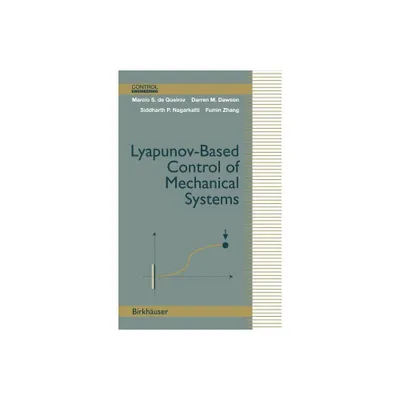Home
PID Passivity-Based Control of Nonlinear Systems with Applications
Loading Inventory...
Barnes and Noble
PID Passivity-Based Control of Nonlinear Systems with Applications
Current price: $145.95


Barnes and Noble
PID Passivity-Based Control of Nonlinear Systems with Applications
Current price: $145.95
Loading Inventory...
Size: Hardcover
*Product Information may vary - to confirm product availability, pricing, and additional information please contact Barnes and Noble
Explore the foundational and advanced subjects associated with proportional-integral-derivative controllers from leading authors in the field
In
PID Passivity-Based Control of Nonlinear Systems with Applications
, expert researchers and authors Drs. Romeo Ortega, Jose Guadalupe Romero, Pablo Borja, and Alejandro Donaire deliver a comprehensive and detailed discussion of the most crucial and relevant concepts in the analysis and design of proportional-integral-derivative controllers using passivity techniques. The accomplished authors present a formal treatment of the recent research in the area and offer readers practical applications of the developed methods to physical systems, including electrical, mechanical, electromechanical, power electronics, and process control.
The book offers the material with minimal mathematical background, making it relevant to a wide audience. Familiarity with the theoretical tools reported in the control systems literature is not necessary to understand the concepts contained within. You’ll learn about a wide range of concepts, including disturbance rejection via PID control, PID control of mechanical systems, and Lyapunov stability of PID controllers.
Readers will also benefit from the inclusion of:
A thorough introduction to a class of physical systems described in the port-Hamiltonian form and a presentation of the systematic procedures to design PID-PBC for them
An exploration of the applications to electrical, electromechanical, and process control systems of Lyapunov stability of PID controllers
Practical discussions of the regulation and tracking of bilinear systems via PID control and their application to power electronics and thermal process control
A concise treatment of the characterization of passive outputs, incremental models, and Port Hamiltonian and Euler-Lagrange systems
Perfect for senior undergraduate and graduate students studying control systems,
PID Passivity-Based Control
will also earn a place in the libraries of engineers who practice in this area and seek a one-stop and fully updated reference on the subject.
In
PID Passivity-Based Control of Nonlinear Systems with Applications
, expert researchers and authors Drs. Romeo Ortega, Jose Guadalupe Romero, Pablo Borja, and Alejandro Donaire deliver a comprehensive and detailed discussion of the most crucial and relevant concepts in the analysis and design of proportional-integral-derivative controllers using passivity techniques. The accomplished authors present a formal treatment of the recent research in the area and offer readers practical applications of the developed methods to physical systems, including electrical, mechanical, electromechanical, power electronics, and process control.
The book offers the material with minimal mathematical background, making it relevant to a wide audience. Familiarity with the theoretical tools reported in the control systems literature is not necessary to understand the concepts contained within. You’ll learn about a wide range of concepts, including disturbance rejection via PID control, PID control of mechanical systems, and Lyapunov stability of PID controllers.
Readers will also benefit from the inclusion of:
A thorough introduction to a class of physical systems described in the port-Hamiltonian form and a presentation of the systematic procedures to design PID-PBC for them
An exploration of the applications to electrical, electromechanical, and process control systems of Lyapunov stability of PID controllers
Practical discussions of the regulation and tracking of bilinear systems via PID control and their application to power electronics and thermal process control
A concise treatment of the characterization of passive outputs, incremental models, and Port Hamiltonian and Euler-Lagrange systems
Perfect for senior undergraduate and graduate students studying control systems,
PID Passivity-Based Control
will also earn a place in the libraries of engineers who practice in this area and seek a one-stop and fully updated reference on the subject.

















